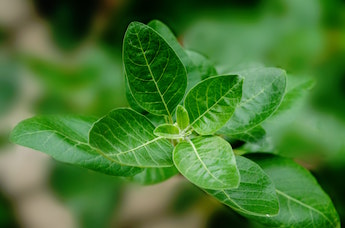 Photo: Bankim Desai
Photo: Bankim Desai
Ashwagandha (Withania somnifera) is probably one of the best-known remedies of the traditional Indian medicine - Ayurveda. It had been used in India for thousands of years to treat all sorts of conditions.
Nowadays, ashwagandha's roots are the most popularly consumed part of the plant.
So what makes this food so valuable from the point of view of human nutrition?
Ashwagandha's main active components are alkaloids (ex., isopelletierine, anaferine, cuseohygrine, anahygrine), steroidal compounds (withanolides, withaferins) and saponins which perform a number of important functions in the body. (Ref. 1)
Thanks to its stimulating effects on our systems, ashwagandha is often referred to as Indian ginseng. (Ref. 1)
In alternative medicine, this food is often prescribed for dealing with adrenal fatigue - a condition when adrenal glands are unable to produce sufficient quantities of hormones required by the body to deal with stress. (Ref. 2)
Adrenal glands work in synergy with the hypothalamus and the pituitary gland and set the tone for how the respiratory, circulatory, lymphatic and other systems respond to external stresses experienced by the body.
When adrenal glands underperform, the most common symptoms we may experience are: tiredness, feeling stressed and sub-par, unable to wake up in the morning without a major infusion of caffeine and other stimulants, and other similar symptoms.
By working on a hormonal level, and also as a powerful adaptogen, ashwagandha re-sets the way the body reacts to stress, and brings it back into balance. (Ref. 1)
Apart from that, ashwagandha is known to relieve anxiety and depression, enhance memory and mental clarity, improve cognition functions, fight off colds and infections, among numerous other benefits. (Ref. 1 and 3)
Written by: Irina Bright
Original publication date: 2013
Updates: 2020
Republication date: 2020
References.
1. Narendra Singh, Mohit Bhalla, Prashanti de Jager, and Marilena Gilca (July 2011). An Overview on Ashwagandha: A Rasayana (Rejuvenator) of Ayurveda. Published in African Journal of Traditional, Complementary and Alternative Medicines. Retrieved May 30, 2013 from: https://www.ncbi.nlm.nih.gov/pmc/articles/PMC3252722/
2. Michael Greer, MD (Winter 2011). Herbal Options for Managing Adrenal Fatigue. Published by Holistic Primary Care. Retrieved May 30, 2013 from: https://holisticprimarycare.net/topics/topics-h-n/herbal-medicine/1242-herbal-options-for-managing-adrenal-fatigue
3. Teixeira ST, Valadares MC, Gonalves SA, de Melo A, Queiroz ML (2006). Prophylactic administration of Withania somnifera extract increases host resistance in Listeria monocytogenes infected mice. Published in International immunopharmacology. Retrieved May 30, 2013 from: https://www.ncbi.nlm.nih.gov/pubmed/16919825